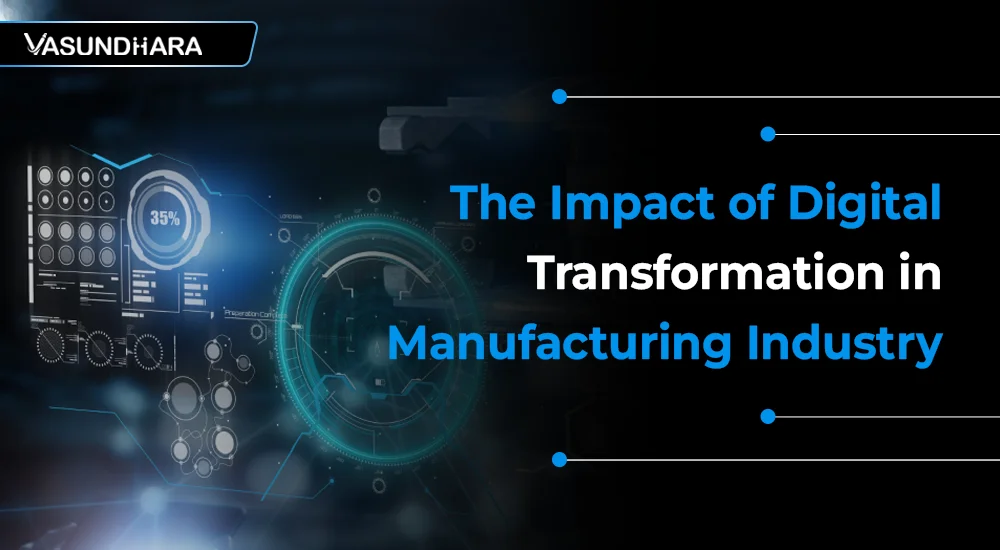The Impact of Digital Transformation in Manufacturing Industry


- Feb 29, 2024



With rapid technological progress, "Digital Transformation" has become popular in various businesses.
Digital transformation involves incorporating digital technologies into all areas of an organization, significantly altering its operations and customer value delivery.
The manufacturing industry, traditionally reliant on conventional methods, is seeing a significant change as it adopts digital transformation.
Digital transformation in manufacturing involves incorporating cutting-edge technologies to enhance efficiency, productivity, and overall competitiveness.
This transformation is not merely about adopting new tools; it signifies a comprehensive overhaul of existing processes, systems, and business models.
Supply chains benefit from enhanced visibility and transparency, reducing lead times and costs. The customization and personalization of products are streamlined, meeting consumer demands efficiently.
Evolving business models focus on services, while enhanced customer experiences and a commitment to sustainability become integral.
However, cybersecurity, workforce adaptation, and integration issues underscore the need for strategic planning and careful execution in this transformative journey.
The manufacturing sector's adaptation to digital transformation strategy is imperative for various reasons.
It enables companies to respond to market dynamics swiftly, improve operational efficiency, reduce costs, and stay competitive in a globalized landscape.
The importance of digital transformation in the manufacturing industry cannot be overstated, as it heralds a paradigm shift in how businesses operate and compete in the global landscape.
Several key factors underscore its significance:
Digital transformation optimizes manufacturing processes, enhancing overall operational efficiency.
Integrating technologies like IoT, AI, and robotics streamlines workflows, minimizes manual interventions, and reduces production cycles, leading to increased productivity.
By automating processes and leveraging data analytics, manufacturers can identify areas of inefficiency, minimize waste, and reduce operational costs.
Predictive maintenance also helps avoid costly downtime, contributing to substantial cost savings.
Digital transformation equips manufacturers with the agility to respond swiftly to market changes and customer demands.
Flexible production capabilities, enabled by advanced technologies, allow for quick adaptation to varying production requirements.
AI and machine learning technologies enhance quality control by analyzing vast datasets and identifying potential issues before they escalate. This ensures the production of high-quality goods, reducing defects and associated costs.
The transparency provided by digital technologies in the supply chain ensures better coordination, visibility, and risk management.
This optimization reduces lead times, lower inventory holding costs, and improved overall supply chain resilience.
Embracing digital transformation is essential for maintaining competitiveness on a global scale.
Manufacturers that leverage advanced technologies position themselves as industry leaders, capable of adapting to evolving market trends and staying ahead of the competition.
Digital transformation in manufacturing is propelled by several key technologies that revolutionize traditional processes and enhance overall operational efficiency.
The integration of these technologies reshapes the manufacturing landscape, offering unprecedented capabilities. The key technologies driving digital transformation in manufacturing include:
The Internet of Things (IoT) has emerged as a cornerstone of digital transformation in manufacturing. IoT connects physical devices and machines to the internet, facilitating real-time data exchange.
In manufacturing, this translates to a network of interconnected devices, sensors, and equipment on the factory floor.
IoT enables manufacturers to monitor and gather data on equipment performance, production processes, and even the condition of finished products.
This real-time data is invaluable for predictive maintenance, minimizing downtime, and optimizing overall operational efficiency.
Artificial Intelligence and Machine Learning play pivotal roles in digital transformation by enabling machines to learn from data and make intelligent decisions.
In manufacturing, AI and machine learning algorithms can analyze vast datasets to identify patterns, predict outcomes, and optimize production processes.
Predictive maintenance, quality control, and demand forecasting are areas where AI excels in manufacturing. These technologies empower manufacturers to make data-driven decisions, improving the precision and efficiency of their operations.
Robotics and automation have been transforming manufacturing for several years, but digital transformation takes these technologies to new heights.
Advanced robotics, coupled with AI, can perform intricate tasks with precision and speed, reducing the need for human intervention in repetitive and labor-intensive processes.
Automation not only enhances efficiency but also contributes to improved safety in manufacturing environments.
It allows workers to focus on more complex tasks, fostering a synergy between human expertise and machine capabilities.
Data analytics is a critical component of digital transformation strategy in manufacturing. The abundance of data generated by IoT devices, production processes, and customer interactions provides manufacturers valuable insights.
Advanced analytics tools help extract meaningful patterns and trends from this data, aiding in better decision-making.
Predictive analytics, for instance, can forecast equipment failures before they occur, preventing costly downtimes.
Moreover, data analytics is instrumental in optimizing supply chain processes, reducing lead times, and enhancing overall operational agility.
Digital transformation in manufacturing has ushered in transformative changes that revolutionize traditional processes, paving the way for a new era of efficiency, flexibility, and innovation.
These changes are particularly evident in the evolution of manufacturing processes, giving rise to smart factories and redefining how products are produced, customized, and delivered. The key transformative changes include:
Digital transformation in manufacturing results in the emergence of smart factories – highly connected and technologically advanced production facilities.
Integrating IoT, AI, robotics, and data analytics in smart factories leads to seamless communication between machines and systems.
This integration allows for real-time monitoring and control of the entire manufacturing process.
For instance, sensors embedded in machinery can transmit data to a centralized system, enabling continuous analysis and optimization of production parameters.
Digital transformation enhances production planning and control through real-time visibility into various stages of the manufacturing process. This visibility allows manufacturers to adapt quickly to changing demands, optimize resource utilization, and minimize bottlenecks.
The ability to adjust production schedules on the fly based on real-time data ensures efficient resource allocation, reducing waste and improving overall production efficiency.
Digital transformation brings transparency and visibility to the entire supply chain. Manufacturers can track the movement of raw materials, work-in-progress, and finished goods in real-time.
This transparency is crucial for identifying inefficiencies, reducing the risk of disruptions, and enhancing overall supply chain resilience.
The integration of IoT in supply chain management enables the tracking of goods throughout the entire journey, providing accurate and up-to-date information to stakeholders at every stage.
By leveraging digital technologies, manufacturers can significantly reduce lead times and operational costs. Real-time data analytics enables better demand forecasting, allowing for more accurate inventory management.
This, in turn, minimizes the need for excess inventory, reducing carrying costs and the risk of obsolescence.
Additionally, the optimization of logistics processes through digital transformation contributes to faster and more cost-effective transportation of goods.
One of the significant advantages of digital transformation in manufacturing is the ability to meet evolving consumer demands for customization and personalization.
Advanced technologies enable the efficient production of small batches or even individualized products without compromising cost-effectiveness.
Manufacturers can leverage data analytics and AI to understand consumer preferences and tailor their products accordingly.
This flexibility in production meets the increasing demand for personalized products in the market.
Digital transformation allows manufacturers to achieve greater flexibility in production. The ability to quickly reconfigure production lines and adapt to changing requirements is a game-changer for manufacturers.
For example, a smartphone factory can swiftly transition to producing tablets based on real-time market demands.
This adaptability ensures manufacturers remain agile in responding to market trends and customer preferences.
Digital transformation in manufacturing necessitates a shift in traditional business models. The move towards servitization, where manufacturers offer services along with their products, is gaining momentum.
This shift from a product-centric to a service-centric model allows manufacturers to provide value-added services such as predictive maintenance, performance monitoring, and even outcome-based pricing.
Additionally, the subscription-based model is becoming more prevalent, enabling manufacturers to establish ongoing relationships with customers and generate recurring revenue.
Digital transformation improves internal processes and enhances the overall customer experience. Manufacturers can leverage data analytics to gain insights into customer preferences, behaviors, and feedback.
This information is invaluable for tailoring products and services to meet customer expectations.
Advanced technologies like augmented reality (AR) and virtual reality (VR) are also being employed to enhance customer experience.
For example, customers can use AR applications to visualize and customize products before purchasing.
Digital transformation is reshaping the manufacturing industry landscape, ushering in an era of unprecedented efficiency, flexibility, and innovation.
The impact extends beyond the shop floor, influencing business models and strategies. Manufacturers embracing digital transformation can enhance customer experience, explore new revenue streams, and contribute to sustainability goals.
Manufacturers must remain agile and adaptive to stay ahead in this dynamic landscape. For companies considering or in the early stages of digital transformation, a strategic approach is paramount.
Collaboration with Digital Transformation service partners and web development services providers can provide valuable insights and support throughout the transformation journey.
For companies seeking expert assistance in web development, Vasundhara Infotech stands as a reliable partner. With a proven track record in delivering cutting-edge web solutions, Vasundhara Infotech can help businesses harness the power of digital technologies to enhance their online presence and support their overall digital transformation goals.
In conclusion, the impact of digital transformation in the manufacturing industry is profound and multifaceted.
As technology advances, manufacturers must embrace the opportunities it presents while navigating the challenges.
The evolving landscape promises a future where digital transformation is not just a strategy but an integral part of the manufacturing DNA.
Contact us today to get started.
Copyright © 2026 Vasundhara Infotech. All Rights Reserved.